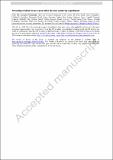Streaming readout for next generation electron scattering experiments
Author(s)
Ameli, Fabrizio; Battaglieri, Marco; Berdnikov, Vladimir V.; Bondí, Mariangela; Boyarinov, Sergey; Brei, Nathan; Celentano, Andrea; Cappelli, Laura; Chiarusi, Tommaso; De Vita, Raffaella; Fanelli, Cristiano; Gyurjyan, Vardan; Lawrence, David; Moran, Patrick; Musico, Paolo; Pellegrino, Carmelo; Pilloni, Alessandro; Raydo, Ben; Timmer, Carl; Ungaro, Maurizio; ... Show more Show less
Download13360_2022_3146_ReferencePDF.pdf (9.409Mb)
Publisher Policy
Publisher Policy
Article is made available in accordance with the publisher's policy and may be subject to US copyright law. Please refer to the publisher's site for terms of use.
Terms of use
Metadata
Show full item recordAbstract
Abstract
Current and future experiments at the high-intensity frontier are expected to produce an enormous amount of data that needs to be collected and stored for offline analysis. Thanks to the continuous progress in computing and networking technology, it is now possible to replace the standard ‘triggered’ data acquisition systems with a new, simplified and outperforming scheme. ‘Streaming readout’ (SRO) DAQ aims to replace the hardware-based trigger with a much more powerful and flexible software-based one, that considers the whole detector information for efficient real-time data tagging and selection. Considering the crucial role of DAQ in an experiment, validation with on-field tests is required to demonstrate SRO performance. In this paper, we report results of the on-beam validation of the Jefferson Lab SRO framework. We exposed different detectors (PbWO-based electromagnetic calorimeters and a plastic scintillator hodoscope) to the Hall-D electron-positron secondary beam and to the Hall-B production electron beam, with increasingly complex experimental conditions. By comparing the data collected with the SRO system against the traditional DAQ, we demonstrate that the SRO performs as expected. Furthermore, we provide evidence of its superiority in implementing sophisticated AI-supported algorithms for real-time data analysis and reconstruction.
Date issued
2022-08-24Department
Massachusetts Institute of Technology. Laboratory for Nuclear SciencePublisher
Springer Berlin Heidelberg
Citation
The European Physical Journal Plus. 2022 Aug 24;137(8):958
Version: Author's final manuscript